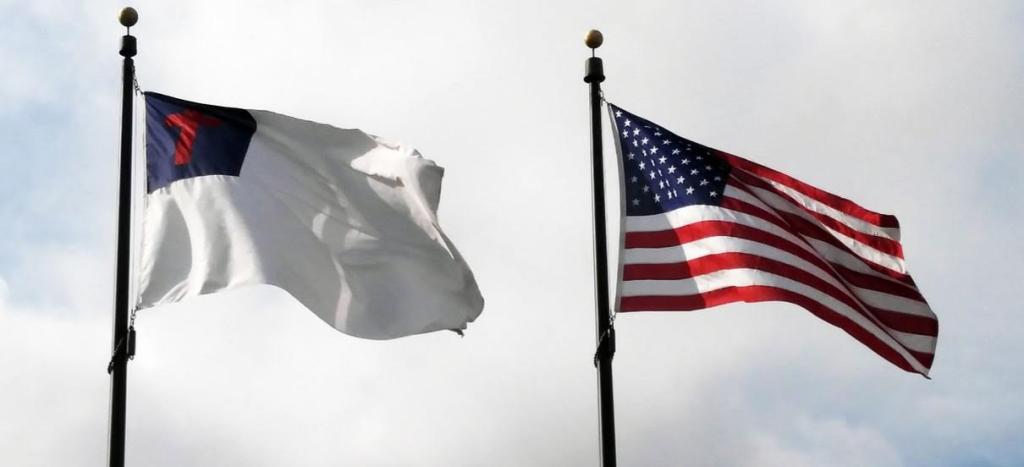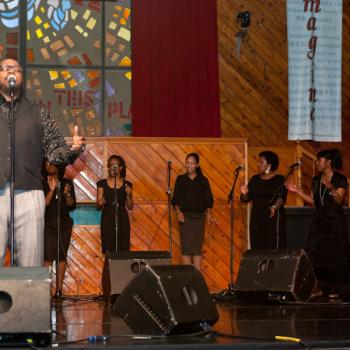Yes — We Need to Rid Ourselves of It & Christian Nationalism

Red, White and Very Blue
Christianity and the Christian flag have become politicized by the growth of Christian nationalism, which begs the question: Should churches remove the Christian flag from their sanctuaries altogether or leave it and associate themselves with dangerous right-wing ideology?
Sadly, very sadly, my answer is to remove it — unless the church supports extreme right-wing politics.
Vista La Mesa Christian Church (Disciples of Christ) in East San Diego County, CA., is one church that decided to remove the Christian flag after insurgents weaponized it during the Jan. 6, 2021, attack on the U.S. Capitol.
The pastor, the Rev. Rebecca Littlejohn, explained in her post, Why My Congregation Removed Flags from Our Church’s Sanctuary, that her church didn’t want to reinforce “the dangerous ideology of Christian nationalism, a twisted belief that uses religion as a mere resource to drive right-wing political ideology.”
Sending the Wrong Message
For Rev. Littlejohn and members of her church, leaving the American and Christian flags standing next to the cross sent the wrong message.
“I’ve become increasingly convinced that we, as committed followers of Jesus, must name, define and understand Christian nationalism, and work to dismantle it, in our congregations and our country,” she said. “The potential danger – to our faith and our country – is simply too high to avoid this task.” Read more here.
My thoughts exactly!
A Perversion of Christianity
“Christian nationalism is a perversion of Christianity,” Littlejohn said in her post. “It is an extremist ideology that co-opts the symbols and rhetoric of our faith and forces them into the service of an agenda of bigoted hatred and violence.”
There is no room for bigotry, hatred and violence in the Christian church. White nationalism and white supremacy twist our faith to the point it’s unrecognizable, and it’s time we said, “Enough!”
The Christian flag had no place in the violent events at Charlottesville, VA, in 2017 or at the U.S. Capitol in 2021. As Littlejohn said, Christians cannot let the good feelings they once had about the Christian flag blind them to the damage that white terrorists are doing to our country.
Should churches remove the Christian flag from their sanctuaries altogether? Littlejohn’s church decided they should, and they removed the American flag along with it.
A Timeworn Tactic
No one should have been surprised when white supremacists wrapped their cause in the Christian flag at Charlottesville or Washington, D.C.
White terrorists have a long history of co-opting Christian imagery to sell their version of racism to the American public, as the KKK did beginning in the late 19th century.
“We’re talking about a minority within a minority, but it is a powerful minority,” said the Rev. Fred Davie, executive vice president of Union Theological Seminary in New York.
“But they do not represent the essence of white Christians in America – or Christians in America overall.” That’s an important point.
Founded on White Supremacy
According to Edward Ahmed Mitchell, deputy executive director of the Council on American-Islamic Relations and a former Georgia prosecutor, “There absolutely is a connection between far-right political extremism and far-right religious extremism, but I doubt these people are showing up at church every Sunday and reading their Bibles.”
Terrorists rarely do, I would say.
Some Christians believe that their religion supports racism. Christian pastors used their sermons to support slavery for centuries prior to the Civil War, citing the Apostle Paul’s writings and other scriptures to sell their version of hate. And if you visit some churches today, you will find white nationalists in the pulpits.
“People don’t want to say that this is a country founded on white supremacy,” Matthew DeMichele, a research sociologist who specializes in extremism, said in an interview with USA Today. “But we know that to be true.”
It bothers me when I hear people loudly and proudly proclaim that the U.S. is a “Christian nation.” If only it were true. But it isn’t true, and we aren’t.
I believe most Americans are good people, but good people from all faiths have remained silent too long.
On the Backs of Black Slaves
No, America isn’t a Christian nation. We are a nation founded on the backs of black slaves brought to our shores in 1619. Slavery kept the South’s economy going for many years, and we had to fight a bloody civil war to end it.
Even then, many whites continued to treat blacks as second- or third-class citizens – if they treated them as citizens at all. And the South passed Jim Crow laws to “keep n***** in their place.”
Vestiges of that terrible past still haunt this country in the 21st century and will continue to haunt us until we thoroughly examine our racism, admit our guilt and deal with it.
What does that actually mean? I’m not sure, but it may begin with conversation. At any rate, there are religious leaders who know better than I what needs to be done.
A National Conversation
It may begin with whites, blacks and other people of color coming together with women’s groups, the LGBTQ community and others to have a national conversation about hatred.
It may mean….
- putting aside the blue state-red state mentality.
- trying to reach a consensus on some issues and to respectfully agree to disagree on others.
- focusing on what’s best for our nation rather than our political party.
- showing badly needed courage.
- letting go of hate.
It will mean….
- listening to various people’s stories, concerns and hopes.
- adjusting to new, legal immigrants entering American society.
- finding better ways to address the divisive problem of illegal immigrants.
- and ending the hold that white supremacists have on our democracy and the Christian church.
To read more of my thoughts on hatred and the Christian church, click here.
Skin Color, Intelligence & Character
White supremacists want no part of a united America. They thrive on using Christianity to divide and conquer.
“It’s very important to understand that it’s not new for white supremacists to have a Christian identity,” DeMichele noted. “But it is intriguing there has been the strengthening overlap of the white nationalists and those of Christian identity.”
There is a difference between white nationalists and white supremacists, DeMichele noted. “White nationalists generally claim the white race is superior and advocate for racial segregation. White supremacists go a step further by insisting that white people deserve to be in charge of everything because of their skin color.” Learn more here.
I wasn’t aware until this moment that a pigment called melanin contributes not only to people’s skin color but also determines their IQ and character. Silly me!
The Christian Flag’s Original Meaning
Seriously, it upsets me to know that Christian nationalists have sullied the Christian flag to the point that it no longer symbolizes the values it was meant to symbolize.
The flag dates to the turn of the 20th century, and its beginnings were quite innocent. A Sunday school superintendent named Charles C. Overton stepped in for a speaker who didn’t show up to teach a class. As he grappled for a subject to present, he noticed the American flag standing near the pulpit and started talking about flags.
Overton mentioned the idea of a Christian flag but didn’t pursue it until 10 years later in 1907, according to Christianity Today, an evangelical magazine. To read the article, click here.
The Flag is Born
Working with another church leader, Overton created a design. His flag was white with a dark blue box in the left-hand corner and a red cross in the center of the box.
- White represented purity.
- Blue meant fidelity.
- Red indicated Christ’s blood.
Sometime later, a Methodist minister named Lynn Harold Hough wrote a pledge to the flag: I pledge allegiance to my flag and the Savior for whose kingdom it stands; one brotherhood uniting all mankind in service and love.
Hough was a liberal, Christianity Today said, and more conservative churches came up with a longer version: I pledge allegiance to the Christian flag, and to the Savior for whose kingdom it stands; one Savior, crucified, risen and coming again with life and liberty to all who believe.
How to Place the Flag
The flag isn’t trademarked, which means anyone can make whatever changes they want to make to it. There’s no copyright on the pledge, either, and various churches use various pledges or create one that suits them.
With those issues more or less settled, Christian leaders next debated placement of the Christian flag in relation to the American flag in their sanctuaries.
- Where should the flag be placed? ‘
- Should it be higher or lower than the American flag?
- Should churches remove the Christian flag from their sanctuaries altogether?
As I write this article, I wonder why Christian churches need a flag of any type. When we attend a church service, we know whether or not we are American citizens. Why do we need a reminder? We also know whether or not we love our country, and we know whether or not we’re Christians. Do we really need a Christian flag? Not when it’s a weapon.
My congregation has an American flag and a Christian flag near the pulpit, but we have never said the pledge to either flag. And I’ve never attended a church service where people did.
Given the rising politicalization of Christian churches, I think the best decision we can make about flags is to remove them. It’s sad for people who want the Christian flag in their sanctuaries, but as the Rev. Littlejohn said, “The potential danger – to our faith and our country – is simply too high to avoid this task.”













